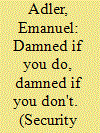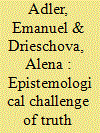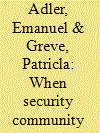|
|
|
Sort Order |
|
|
|
Items / Page
|
|
|
|
|
|
|
| Srl | Item |
| 1 |
ID:
097369


|
|
|
|
|
| Publication |
2010.
|
| Summary/Abstract |
This article seeks to initiate a new round of strategic intellectual innovation in an era when threats posed by non-state terrorist organizations and their state supporters do not resemble Cold War threats. Based on an interpretative sociological reading of the concepts of power, security, and rationality, it argues that a "damned if you do, damned if you don't" dilemma is to the post-Cold War era what the danger of surprise attack or unintended nuclear war was to the Cold War: the defining structural threat of international politics. The dilemma leaves states confronting asymmetrical warfare with the choice of reacting with force to a terrorist act or practicing appeasement. Neither approach, however, can achieve the goal of putting an end to terrorism. Deterrence sustains the dilemma by providing a rationale for why force should be used and why self-restraint is irrational. This article proposes a third option, defusing, which may be accomplished by denial (preventing provocateurs from dragging states into the use of force) and restructuration (transforming the structure and rules of the situation). Defusing relies on "performative power"-the capacity to project a dramatic and credible performance on the world stage and to decouple social actors, their audiences, and their most deeply held strategic beliefs. The force of the argument is illustrated by examples from the global "war on terror," the 2006 Lebanon War, the 2008-09 operation "Cast Lead" in Gaza, and the Iranian nuclear crisis.
|
|
|
|
|
|
|
|
|
|
|
|
|
|
|
|
| 2 |
ID:
178562


|
|
|
|
|
| Summary/Abstract |
Truth-subversion practices, which populist leaders utilize for political domination, are a significant source of current pressure on the Liberal International Order (LIO). Truth-subversion practices include false speak (flagrant lying to subvert the concept of facts), double speak (intentional internal contradictions in speech to erode reason), and flooding (the emission of many messages into the public domain to create confusion). Aiming to destroy liberal truth ideals and practices, truth subversion weakens epistemological security; that is, the experience of orderliness and safety that results from people's and institutions’ shared understandings of their common-sense reality. It privileges baseless claims over fact-based opinions, thus creating communities of the like-minded between which communication becomes impossible. Truth subversion challenges the LIO's three key institutions: democracy, markets, and multilateralism. If truth-subversion practices prevail, societal polarization, inaccurate information, and emotional inflaming strain democracy and human rights protections. Markets that depend for their functioning on accurate information can falter, and multilateralism that relies on communication and reasoned consensus can decay. International relations (IR) scholarship has recognized knowledge production practices as a key feature underlying the LIO, but has not yet identified challenges to those practices as a threat for the LIO. We discuss what the discipline can do to alleviate its blind spots.
|
|
|
|
|
|
|
|
|
|
|
|
|
|
|
|
| 3 |
ID:
082701


|
|
|
|
|
| Publication |
2008.
|
| Summary/Abstract |
This article invokes a combination of analytical and normative arguments that highlight the leading role of practices in explaining the expansion of security communities. The analytical argument is that collective meanings, on which peaceful change is based, cognitively evolve - i.e. they are established in individuals' expectations and dispositions and they are institutionalized in practice - because of communities of practice. By that we mean like-minded groups of practitioners who are bound, both informally and contextually, by a shared interest in learning and applying a common practice. The normative argument is that security communities rest in part on the sharing of rational and moral expectations and dispositions of self-restraint. This thesis is illustrated by the example of the successful expansion of security-community identities from a core of North Atlantic Treaty Organization (NATO) states to Central and Eastern European countries during the 1990s, which was facilitated by a `cooperative-security' community of practice that, emerging from the Helsinki Process, endowed NATO with the practices necessary for the spread of self-restraint.
|
|
|
|
|
|
|
|
|
|
|
|
|
|
|
|
| 4 |
ID:
087931


|
|
|
|
|
| Publication |
2009.
|
| Summary/Abstract |
By now arguments about the varieties of international order abound in International Relations. These disputes include arguments about the security mechanisms, institutions, and practices that sustain international orders, including balance of power and alliances, hegemony, security regimes based on regional or global institutions, public, private, and hybrid security networks, as well as different kinds of security communities. The way these orders coexist across time and space, however, has not been adequately theorised. In this article we seek to show (A) that, while analytically and normatively distinct, radically different orders, and in particular the security systems of governance on which they are based (such as balance of power and security community), often coexist or overlap in political discourse and practice. (B) We will attempt to demonstrate that the overlap of security governance systems may have important theoretical and empirical consequences: First, theoretically our argument sees 'balance of power' and 'security community' not only as analytically distinct structures of security orders, but focuses on them specifically as mechanisms based on a distinct mixture of practices. Second, this move opens up the possibility of a complex (perhaps, as John Ruggie called it, a 'multiperspectival') vision of regional security governance. Third, our argument may be able to inform new empirical research on the overlap of several security governance systems and the practices on which they are based. Finally, our argument can affect how we think about the boundaries of regions: Beyond the traditional geographical/geopolitical notion of regional boundaries and the social or cognitive notion of boundaries defined with reference to identity, our focus on overlapping mechanisms conceives of a 'practical' notion of boundaries according to which regions' boundaries are determined by the practices that constitute regions
|
|
|
|
|
|
|
|
|
|
|
|
|
|
|
|
|
|
|
|
|